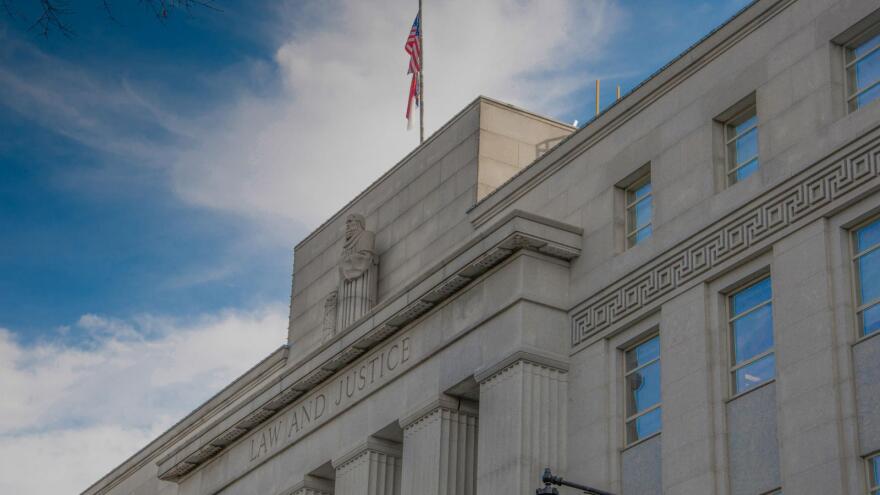This Thursday, the North Carolina Supreme Court will hear oral arguments in the ongoing Leandro court case. This landmark education funding case reaches its 30th anniversary this year.
The case began in 1994 when families from five rural school districts sued the state, arguing that it wasn’t meeting its duty, set out in the state constitution, to provide their children with equal access to an education.
For decades, judges have monitored the case. The North Carolina Supreme Court has ruled on it four times before, ultimately leading the Court to order state lawmakers to fund a multi-billion dollar remedial plan to improve public schools. Attorneys for Republican lawmakers have intervened, arguing it's unconstitutional for judges to decide how lawmakers spend state funds.
The North Carolina Supreme Court ruled on these questions in 2022. But now that Republicans have taken the majority on the Supreme Court, attorneys for the legislature are appealing the prior court’s decision. The new court could overturn that decision to increase funding for schools.
This appeal and rehearing is unusual — and highly political.
In 2022, the North Carolina Supreme Court — then led by a Democratic majority — ruled that state lawmakers must fund a multi-billion dollar plan that a lower court judge ordered to make schools more equitable.
Typically, if a Supreme Court’s decision is not appealed within 30 days, the ruling would stand.
“For legislators to come in, a year later and ask for review is just very unusual,” said Jane Wettach, professor emerita at Duke University’s school of law. “Normally, they wouldn't have any grounds for asking for a review.”
Attorneys representing Republican leaders in the legislature Phil Berger and Tim Moore waited until the makeup of the NC Supreme Court changed after an election to ask for another hearing. The balance on the court has now shifted to a Republican majority.
“Honestly, this is one of the most astounding egregious acts that I have ever witnessed in my 24-year career as an attorney,” said David Hinojosa, an attorney in the case who represents students in the Charlotte-Mecklenburg school district.
“Just like every other litigant who loses before this Court, if either Mr. Berger or Mr. Moore wanted this Court to reconsider any holding in Leandro IV, they had but one option: to timely and properly petition this Court for rehearing,” wrote attorney Melanie Dubis, who represents Hoke County Schools, in the opening statement of a brief. “They did not.”
Rehearing cases has become a pattern for this court. The North Carolina Supreme Court also reheard and overruled a prior Supreme Court decision regarding voting districts in Moore v. Harper. But Hinojosa says that appeal followed standard legal procedure, while attorneys for state lawmakers in the Leandro case did not.

Adding to the political nature of the hearing is the fact that Senate leader Phil Berger is a party to the case and his son Phil Berger Jr. serves on the court. Attorneys for the plaintiffs and defendants requested Justice Berger and Justice Anita Earls — a Democrat who filed briefs in the Leandro case years ago — to recuse themselves from the case in 2022. Both refused.
The immediate stakes are whether the NC Supreme Court will rule that the legislature must pay $678 million to fund a statewide remedial plan for public schools.
The narrow question that the Supreme Court will weigh this week is whether Wake County Superior Court Judge James Ammons fairly calculated how much the North Carolina General Assembly owes on a court-ordered remedial plan to improve public schools across the state.
Following the last Supreme Court ruling in the Leandro case, Ammons determined the state still owed $678 million to fund the second and third years of the plan.
Attorneys for the legislature describe that plan as a “sweeping, eight-year, 146-item plan.” They argue that some of the judge’s calculations of education funding in recent state budgets to fulfill the remedial plan are inaccurate.
The bigger stakes are whether the NC Supreme Court will rule that courts can order a statewide solution for education inequities in North Carolina.
In their appeal, attorneys for state lawmakers also repeat arguments they made in the last hearing by the then democratically-controlled Supreme Court. They argue that it is unconstitutional for judges to order the spending of state funds, because the state constitution exclusively grants lawmakers that power.
Legislative attorneys cite past court rulings. Attorney Matthew Tilley writes in his brief that the state constitution’s appropriations clause “states in language no man can misunderstand that the legislative power is supreme over the public purse.”
Attorneys for state lawmakers further argue that the Leandro case does not merit a statewide remedy for all North Carolina public schools, because the original trial only examined conditions in Hoke County Schools.
Attorneys for the school districts said that question has been thoroughly established in past precedent, and that the North Carolina Supreme Court has already determined that a statewide remedy is necessary.
“All the way from 2002 to 2018, the court made findings showing that students all across the state, especially students in at-risk circumstances, were suffering miserably as a result of the lack of a sound basic education,” said attorney David Hinojosa.
‘[Legislative attorneys] ask this Court to reconsider the holdings of the Leandro IV decision and indeed “overturn” it,” wrote attorney Melanie Dubis. “There is no procedural mechanism that could possibly permit such convoluted gamesmanship.”
Hinojosa said during the hearing this week, he will be looking for signs of whether the justices might rule that the case does not warrant a statewide remedy to improve school conditions across the state — or if the court might rule narrowly on how much funding is required.
The Supreme Court will hear arguments on Thursday and is expected to release a decision in the coming months.








